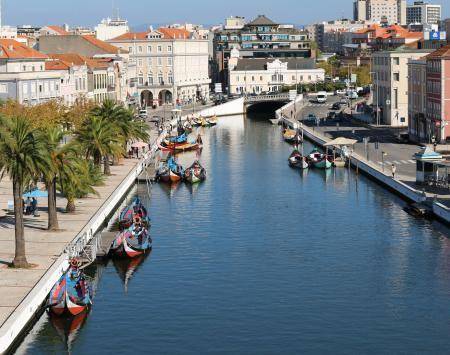Ventspils & Valmiera
Jobs and skills in the local economyNextGen Microcities - Next Generation Micro Cities of Europe
"A great part of Europeans lives in microcities, which are becoming regional economic hubs, offering comprehensive services, opportunities and a dynamic environment. Innovations introduced by the NextGen Microcities project in the overall urban development systems of Ventspils and Valmiera will contribute to career development and education, to becoming magnet cities for talent and foreign direct investment and to creating new jobs. We strive to provide project results to other European microcities as an input to their development."
European microcities such as Ventspils and Valmiera play an important role in European economy. They become regional economic hubs, offering comprehensive services, opportunities and a dynamic environment for development. Ventspils and Valmiera are similar in profile. They are the next generation of microcities that use global and digital potential and introduce a series of innovation. Ventspils and Valmiera have formed a strong partnership to address several common challenges.
- Ventspils and Valmiera each year shrink by an average of 0,59%. Although the situation is improving, brain drain occurs due to emigration and migration to capital city. Enterprises are increasingly lacking in skilled workforce, especially in ICT and other technical sectors.
- Cities lack a comprehensive career development support for both pupils, students and adults. Extremely few young people choose their careers in STEM. Adults require retraining. They must develop digital skills.
- Technical industries are increasingly demanding skilled workforce. There is a skills mismatch as well as a large gap between labour supply and demand; the demand for ICT specialists exceeds the supply by 2 to 3 times.
- Vocational schools and universities do not always keep up with the rapid changes in labour market. Generational disparities have become a major challenge in successful communication and marketing. The use of educational technologies and modern educational programmes in the educational process is lacking. Too few international students choose local universities as their alma mater.
- Public support to industry to create new jobs should increase. There are too few joint projects by industry, educational institutions and research institutes. Public sector lacks proactive and innovative marketing approaches to attract local and foreign direct investment, especially in technical sectors.
NextGen Microcities project introduces several urban development system innovations in Ventspils and Valmiera. The solutions and results of the project will become the inspiration for other European microcities to grow and develop. The key innovative actions are following:
- Implementation of comprehensive microcity-wide career development support system to pupils, students and adults based on Gatsby Foundation Good Career support principles. It includes retraining of workforce for ICT sector and the development of a digital solution for attracting talent.
- Development and implementation of generational marketing strategy and action plans for local vocational schools and universities.
- Development of “EdTech Factory”, a digital innovation hub for educational sector. It is also a pioneer, enthusiast and innovator of educational technologies helping educational organisations and companies become more competitive.
- Introduction of EdTech solutions into local vocational schools and universities – both technical solutions as well as adapted and new study programs, approaches and methodology.
- Implementation of an innovation grant scheme for local businesses piloting the approach of The Ten Types of Innovation Framework by Doblin Deloitte as well as promoting joint projects by industry, educational institutions and research institutes. It includes testing the “whole city as an innovation test-bed” approach.
- Piloting microcity Makerspaces, an open-type workshops and prototyping hubs encouraging start-ups and business idea authors, “maker movement” in technical sectors as well as utilisation of sharing economy principles.
- Development and implementation of innovative FDI strategy and FDI marketing plan. It includes piloting of FDI attraction campaign using the “whole city as an innovation test-bed” approach.
- Ventspils City Council with Valmiera City Council
- Ventspils High Technology Park - business support organisation
- Valmiera Development Agency - business support organisation
- Ventspils Vocational School - education/ training centre and school
- Valmieras Technical School - education/ training centre and school
- Ventspils University of Applied Sciences - higher education and research institute
- Vidzeme University of Applied Sciences - higher education and research institute
- Aspired Ltd - private company
- IntelliTech Ltd. - private company
The success of the NextGen Microcities project will be reflected in the following changes and results in Ventspils and Valmiera:
- The number of students in both universities and both vocational schools increases, in particular filling all available study places in ICT faculties.
- The percentage of international students in both universities reaches the European average.
- Four EdTech solutions as well as EdTech based study programmes are introduced to students, lecturers and teachers. All EdTech solutions are used on regular basis by all ICT students and students from other faculties and programmes.
- At least 10 new EdTech solutions are developed by the EdTech Factory, a digital innovation centre for educational sector.
- At least 100 ICT talents attracted to microcities, at least 100 people retrained for the ICT sector.
- At least 1000 pupils and students engaged in career development activities, including 250 pupils actively participating in the summer employment programme pilot.
- More pupils choosing STEM fields as their future career paths.
- Two Makerspaces in both cities are up and running, offering regular events and services that boost maker community, sharing economy practices as well as development of product prototypes to be commercialised.
- At least 10 innovations introduced and implemented by enterprises. In both cities at least 20 new enterprises established, and at least 160 new workplaces created.
- In 2020/2021 both cities are awarded the 1st and 2nd places by the fDi Magazine, a publication of the Financial Times (European Cities and Regions of the Future ranking, category of Microcities).
- Many results capitalised and transferred to other European microcities.
June 2019: Career development support programme as well as the programme for attracting qualified specialists launched. First innovation grants available. First summer employment programme ready to go.
December 2019: EdTech Factory laboratory and Makerspaces Report on Economic sustainability model of 2 new Makerspaces. FDI strategies for microcities developed.
March 2020: Innovative EdTech equipment delivered and technology adaptation started. Digital platform “Future Career Office” developed and available. Generational marketing campaigns to attract both national and international students launched. The manual for retraining programme for ICT talent developed.
October 2020: The use and application of EdTech in study process started. The first FDI campaign in progress. The midterm evaluation of the project innovative actions done.
January 2021: Most of the retraining programme’s results reached. Last call for the retraining programme opened.
July 2021: Recommendations for other European microcities and urban networks done and ready to be disseminated.
















































